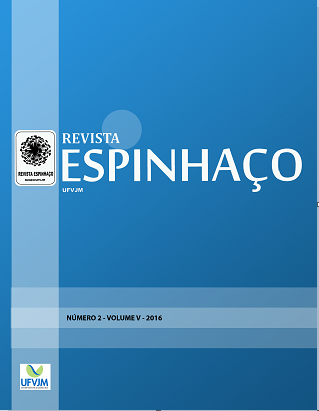Determinação e avaliação de fatores associados com práticas de gerenciamento sustentável da terra por agricultores do estado de Osun, Nigéria
DOI:
https://doi.org/10.5281/zenodo.3957974Palavras-chave:
determinação, avaliação, gerenciamento da terra, agricultoresResumo
Este estudo identificou práticas de gestão ambiental utilizados por agricultores no estado de Osun, Nigéria, determinando os fatores associados com as melhores práticas utilizadas. A técnica de amostragem multi-estágio foi utilizada para selecionar 256 agricultores de oito Áreas Governamentais Locais (AGLs) do estado. Oito diferentes empresas agrícolas foram selecionadas nas AGLs e, também, quatro agricultores formam selecionados de cada empresa. Os dados coletados foram descritos com base na frequência, média e desvio padrão, enquanto as análises de regressão e de fatores foram utilizadas para realizar inferências neste estudo. Os resultados revelaram que o grupo de agricultores era majoritariamente formado por homens (60%) que tinham, em média, 48.0±10.3 anos de idade. O tamanho médio dos domicílios era de 6.6±2.8 e a maior parte dos residentes não eram capazes de ler e escrever. O estudo identificou 35 práticas de gerenciamento sustentável da terra conhecidas pelos agricultores, sendo que 28 destas 35 práticas eram efetivamente utilizadas. Sete fatores associados com o uso sustentável da terra são: experiência, acesso à recursos econômicos, acesso recursos educacionais, acesso à insumos, características pessoais, características familiares e status de fertilidade do solo. Os fatores estimados são estatisticamente significantes (p < 0,05), demostrando que os níveis de consciência e de uso de práticas de gerenciamento sustentável no estado estão abaixo dos padrões esperados.
Referências
Ademola AO, Olujide MG. 2014. Soil conservation practices of Arable crop farmers in Atisbo Local Government Area of oyo state, Nigeria. Journal of Advances in research 2 (12): 879-888.
Adikwu JO. 2014. Household size and agricultural land-use pattern in Obagaji area of the Guinea Savanna region, Nigeria. Journal of Agricultural Extension and Rural Development. 6 (1): 48-54.
Balogun OS, Aliyu TH, Musa AK. 2013. Perception of Fadama III participating farmers on pest and diseases and the use of integrated pest management control strategy in Kwara state, Nigeria. Ethiopian Journal of Environment Studies and Management. 6 (6).
Canuel M, Abdous B, Belang D, Gosselin P. 2014. Development of Composite Indices to Measure the Adoption of Pro-Environmentak Behaviours across Canadian Provices. PLoS 9 (7).
Carter MR. 2002. Soil Quality for Sustainable Land Management. Agron Journal. 94: 38-47.
Fabiyi Y L. 1990. Land Policy for Nigeria; issues and perspectives. Inaugural. Lecture Series 99, OAU, Ile-Ife.
Famuyiwa BS, Olaniyi O A, AS Adesoji. 2017. Appropriate Extension Methodologies for Agricultural Development in Emerging Economies in Agricultural Development and Food Security in Developing Nations. Wayne G, G, Ronald D, and Wendy-Ann P. I (eds). IGI Global, United States of America.
Fed. Min. Of Agriculture and Water Resources. 2009. Third National Fadama Development Project (Fadama III) 1.
GEF. 2010. Scaling up Sustainable Land Management Practice and Coordination. Project Information. GEFSEC PROJECTID: 3384.
Herrick JE. 2000: Soil quality: an indicator of sustainable land management? Applied Soil Ecology Journal. Elsevier. 15 (1):75- 83.
Hoffmann V. 2006. Knowledge and Innovation Management, Reader, University of Hohenheim, Stuttgart, Germany.
Iwuchukwu JC, Igbokwe EM. 2012. Lessons from Agricultural Policies and programmes in Nigeria. Journal of Law, Policy and Globalization. 5.
JibowoG. 1999 Essentials of rural sociology, Gbemi Sodipo Press Ltd. Abeokuta, Nigeria.
Muge AE, Dianne AR. 2011. Knowledge, Attitude and Practice on Land Degradation and Sustainable Land Management in Grenada; Technical Report and Recommendation on January, 2011 for the SLM Project. Ministry of Agriculture, Grenada.
Ndah HT, Schuler J, Uthes S, Zander P. 2010. Adoption Decision theories and conceptual models of innovation systems: overview of existing modeling approached(Session 3). Leibniz-centre for Agricultural Landscape Research(ZALF) e.v. CA2 Africa. Inception Workshop, Nairobi.
Orisakwe L, Agomuo FO. 2011. Adoption of Improved Agroforestry Technologies among contact farmers in Imo State, Nigeria. Asian journal of Agriculture and Rural Development. 2 (1): 1-9
Oyekale AS. 2012. Fuzzy Indicators of Sustainable Land Management and its correlates in Osun State, Nigeria. Journal of Human Ecology. 39 (3): 175-182
Rogers EM. 2003. Diffusion of innovations, fifth edition. Free Press, New York, USA.
Sharif ABM, Rahmann MM, Alam MB, Kamaly M H K. 2013. Adoption of roduction technologies by Potato growers in northwest Bangladesh. Rajshahi University Journal of life & earth and agricultural sciences. 41: 29- 39.
Simon BP, Ndaghu AA,Yohanna I. 2013. Awareness of sustainable Agricultural Land Management Practices among crop farmers in northern part of Taraba state, Nigeria. ARPN journal of science and Technology. 3(5)
Toluwase S O, Apata O M. 2013. Impact of farmers’ cooperative on Agricultural Productivity in Ekiti state, Nigeria. Journal of Agricultural Science. 3(1): 63-67.
World Bank. 2005. GEF Project document on proposed grant from the Global Environment Facility Trust Fund. Report no: 34232-NG, Country Department 12, Africa Region.
World Bank. 2010. Project Appraisal Document for a scaling up sustainable land management practice, knowledge and coordination. Report number: 54888- NG.
Downloads
Publicado
Como Citar
Edição
Seção
Licença
Copyright (c) 2022 Revista Espinhaço

Este trabalho está licenciado sob uma licença Creative Commons Attribution-NonCommercial-NoDerivatives 4.0 International License.


